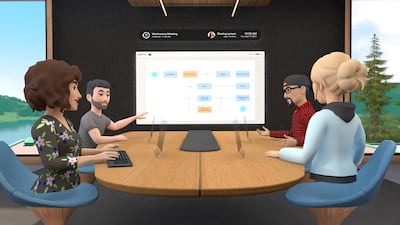Facebook has launched a test of a new virtual-reality remote work app where users of the company's Oculus Quest 2 headsets can hold meetings as avatar versions of themselves.
The beta test of Facebook's Horizon Workrooms app, which was launched on Thursday, comes as many companies continue to work from home after the Covid-19 pandemic shut down physical workspaces and as the Delta variant sweeps across the globe.
Facebook views its latest launch as an early step towards building the futuristic "metaverse" that chief executive Mark Zuckerberg has touted in recent weeks.
"Workrooms is our flagship collaboration experience that lets people come together to work in the same virtual room, regardless of physical distance," the company said in an Oculus blog post.
"It works across both virtual reality and the web and is designed to improve your team's ability to collaborate."
The world's largest social network has invested heavily in virtual and augmented reality, developing hardware such as its Oculus VR headsets, working on AR glasses and wristband technologies, and buying a bevy of VR gaming studios, including BigBox VR.
Gaining dominance in this space, which Facebook bets will be the next big computing platform, will allow it to be less reliant in the future on other hardware makers, such as Apple, the company has said.
Andrew Bosworth, Facebook's vice president of its Reality Labs group, said the new Workrooms app gives "a good sense" of how the company envisions elements of the metaverse.
"This is kind of one of those foundational steps in that direction," said Bosworth.
The term "metaverse", first coined in the 1992 dystopian novel Snow Crash, is used to describe immersive, shared spaces accessed across different platforms where the physical and digital converge. Zuckerberg has described it as an "embodied internet".
It has been referenced in several recent earnings calls by tech bosses including Zuckerberg, Microsoft Corp's Satya Nadella, gaming company Roblox Corporation's David Baszucki and Match Group's Shar Dubey, who have talked about how their companies could shape aspects of this futuristic realm.
In July, Facebook said it was creating a product team to work on the metaverse, which would be part of its AR and VR group Facebook Reality Labs.
In its first full VR news briefing, the company showed how Workrooms users can design avatar versions of themselves to meet in virtual reality conference rooms and collaborate on shared whiteboards or documents, still interacting with their own physical desk and computer keyboard.
The app, free through the Quest 2 headsets which cost about $300, allows up to 16 people together in VR and up to 50 in total, including video conference participants. People without a headset can join with a video call.
Bosworth said Facebook was now using Workrooms regularly for internal meetings.
The company said it would not use people's work conversations and materials in Workrooms to target ads on Facebook. It also said users must follow its VR community standards and that rule-breaking behaviour can be reported to Oculus.

